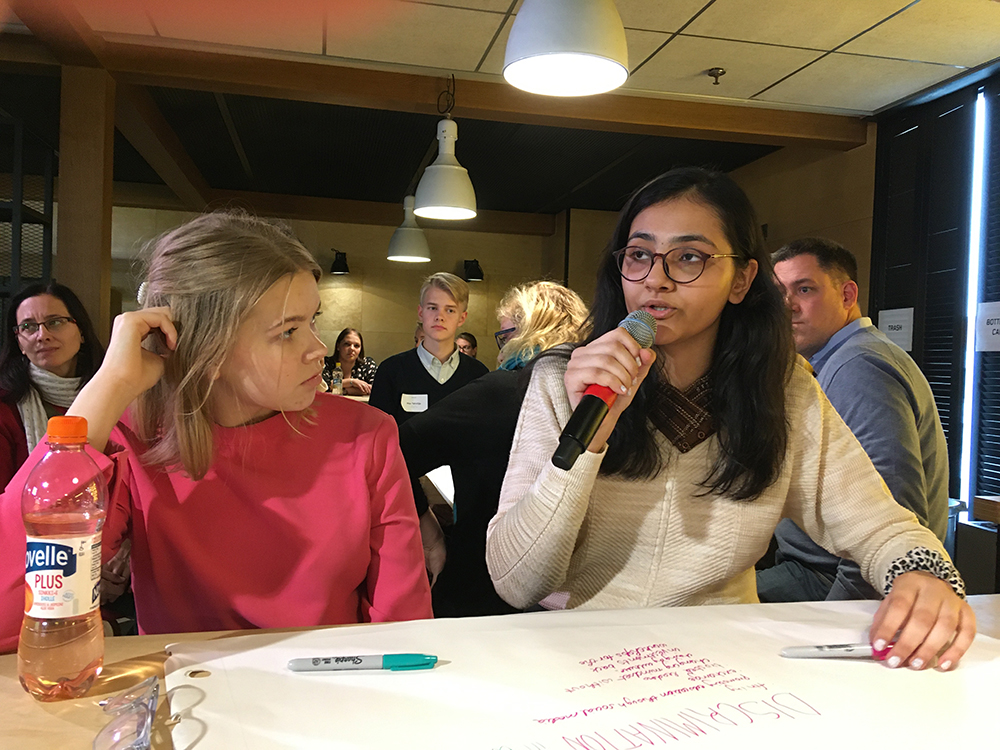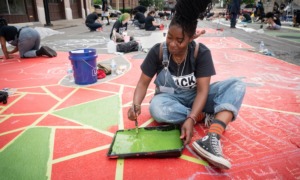
Stell Simonton
Vrinda Gandhi, 16, of Delhi, India, speaks during a discussion at a youth summit in Helsinki, Finland, on Nov. 4 that brought together youth leaders from different countries to discuss changes they seek in education. At left is Alma Rantalaiho, 15, a member of the Helsinki Youth Council.
HELSINKI, Finland — Teenage members of the Helsinki Youth Council joined with student leaders from India and Venezuela to call for greater youth voice in shaping their education, at a Nov. 4 youth summit in this city.
The event was sponsored by the global nonprofit HundrED and the city of Helsinki and was part of a series of events known as Helsinki Education Week, intended to showcase innovative education practices.
“How can you make decisions for people without asking them?” said Alma Rantalaiho, 16, a student at Ressu High School in Helsinki and a member of the youth council. “Not everyone thinks we are capable, but we have a lot of opinions.”
“We need a space in government,” said Venezuelan student Albany Parra, 14, of Caracas,
Consulting youth is part of the ethos in Helsinki government.
Thirty teenagers ages 13-17 sit on the youth council, which meets about twice a month.
Although they do not have decision-making power, youth members attend committee meetings of the four city departments: education, urban environment, culture and leisure, and social services and health care. The goal is to increase young people’s participation in and understanding of how city decision-making works. Youth council members are elected every two years.
“I meet with the members of the youth council very often,” said Deputy Mayor Pia Pakarinen at City Hall on Nov. 5. They bring insight, she said. “We encourage participation,” and this idea is found at all levels in the city, she said.
Even children in daycare are encouraged to have a voice, she said, by letting them — as one daycare center did — offer ideas for the name of the center. It teaches them to take part, she said.
Participation in decision-making “is an important lesson,” she said. It involves give-and-take.
“You also learn to lose,” she said.
Making change
Three youth “ambassadors” from HundrEd, including Parra of Venezuela, took part in the panel discussion at the youth summit. HundreED spotlights innovations in education around the world.
Meeting youth from other countries made HundrED youth ambassadors and Helsinki Youth Council members more aware of disparities in education systems from nation to nation, they said.
The government and economy of Venezuela are in crisis, Parra said. It was difficult for her to see the educational benefits enjoyed by students in Finland that are not available in Venezuela, she said.
“I want to bring change to my country,” she said. Youth need a voice because “we are the ones going to be the medics, the engineers and the [leaders] of the future,” she said.
Parra became a youth ambassador after an adult at her school told her about the HundrED youth project and encouraged her to apply.
Ruhan Anjan Kartik, 15, came to Finland from India when he was 12. He said schools in India have become focused on grades, colleges and jobs.
“The real purpose of education has been lost,” he said. Education is really about understanding how the world works, he said.
Vrinda Gandhi, 16, is a youth ambassador from Delhi. Education is a tool available to some but not all, she said.
“People encourage their sons to study, but not their daughters,” she said. There’s discrimination around race, caste and gender, she said. She was influenced by the struggle her grandmother had to make to continue her education after getting engaged at 16.
Helsinki Youth Council members Iiris Kuparinen, 15, Kulosaari High School, and Tilda Lassila, 17, Kallio High School Upper Secondary School, also took part in the panel.
Young people need to have a voice now in shaping the future since they’re the ones who’ll be living in it, Kuparinen said.
Lassila described herself as someone with a passion for democracy. “Young people have so much potential,” she said.































